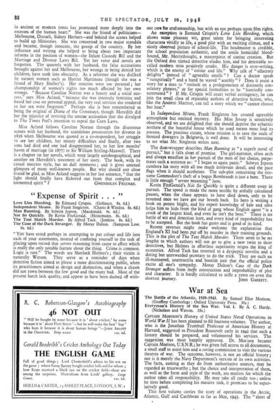"Expense of Stpirit . • • tt
8s. 6d.)
"You have erred perhaps in attempting to put colour and life into each of your statements, instead of confining yourself to the task of placing upon record that severe reasoning from cause to effect which is really the only notable feature about the thing. Crime is common. Logic is rare." The words are Sherlock Holmes's ; their victim is naturally Watson. They serve as a reminder of days when detective fiction aimed to please a more discriminating public, when its practitioners aimed at design and distinction, and when a chasm did not yawn between the few good and the many bad. Most of the present batch lack quality, and appear to have been dashed off with- out care for craftsmanship, but with an eye perhaps upon film rights.
An exception is Esmund Grispin's Love Lies Bleeding, which shows some pleasant wit, great talent for bringing interesting characters vividly to life, a good plot with an exciting climax, and a nicely observed picture Of school-life. The headmaster is credible, the school population authentic, and the senile homicidal blood- hound, Mr. Merrythought, a masterpiece of canine creation. But the Oxford don turned detective eludes him, and his detestable so- called modern miss positively creaks. His danger is over-writing, which is the enemy of "colour and life." Why talk of "olfactory delights" instead of "agreeable smells " ? Can a doctor speak " vampirically " and a hand be waved " acerbly " ? Does it assist a story for a man to "embark on a prolegomenon of discreetly con- solatory phrases," or for special formalities to be "hurriedly con- summated" ? If Mr. Crispin will court verbal astringency, he can join the small class of reputable authors of detective fiction, who, 'like the Ancient Mariner, can tell a story which we "cannot choose but hear."
In Independent Means, Frank Singleton has created agreeable atmosphere but omitted mystery. His Miss Jessop is sensitively observed, and we are delighted that she should deprive the sybaritic aesthete of the beautiful house which he used means most foul to possess. The precious curate, whose mission is to save the souls of monied dowagers in Belgravia, is well done. It will be interesting to see what Mr. Singleton writes next.
The dust-wrapper describes Man Running as "a superb novel of pursuit," but it falls shan of promise. The girl-narrator, often arch and always steadfast in her pursuit of the men of her choice, perpe- trates such a sentence as: "I began to again panic." Selwyn Jepson cumbers his story with all too much irrelevant detail, and the pace flags when it should accelerate. The sub-plot concerning the tire- some Commodore's theft of a bogus Rembrandt is just a bore. There is little enough "severe reasoning " here.
Kevin FitzGerald's Not So Quickly is quite a different essay in pursuit. The speed is made the more terrific by artfully calculated pauses, when the chase appears to have died down, only to be resumed once we have got our breath back. Its hero is writing a book on potato blight, and his expert knowledge of kale and silos helps him to hide from the kind of gang whose English agent "is a crook of the largest kind, and even he isn't the boss." There is no battle of wit and detection here, and every kind of improbability has to be accepted. But the book has gusto and is good of its kind.
Recent reverses might make welcome the explanation that England's XI had been gut off by murder in their training grounds. This is the plot of The Test Match Murder. There seem to be no lengths to which authors will not go to give a new twist to their detectives, but Holmes in effortless superiority reigns the king of eccentrics. Alfred Tack has resorted to a dyspeptic novelist and a doting but unrewarded secretary to do the trick. They are such an ill-mannered, unattractive and boorish pair that the official police excite all one's sympathy. Moray Dalton's Case of the Dark Stranger suffers from rneik construction and improbability of plot and character. It is hardly calculated to stifle a yawn on even the


































 Previous page
Previous page